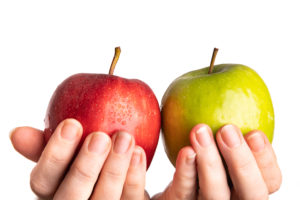
But for the many who miss the boat, you might be inclined to purchase fresh produce. Unfortunately, however, many popular frozen fruit and vegetable options like berries, broccoli, spinach, and green beans don’t keep long when purchased fresh.
Surely, you’ve bought blueberries only to open them and find mold shortly after buying.
So, what can you do? In some cases, you can buy fresh, separate into single servings, and freeze. Doing this is essential so you don’t end up with a massive frozen block of berries, for example.
Some vegetables, like broccoli, must be blanched before freezing. That simply means boiling them until they become bright green (a few minutes), before drying, dividing into serving sizes, and freezing.
But several fruits and vegetables can last for weeks, even months, in your fridge or cupboard. So, if you’re short on freezer space but still need to ensure intake of heart-healthy and cholesterol-lowering fruits and vegetables, here’s a list:
Apples: Apples are rich sources of fiber, quercetin (a valuable antioxidant), and water. Potential health benefits of apples include lower blood sugar and diabetes risk, improved heart health, and a healthier population of gut bacteria.
Apples can be stored for up to four months in certain conditions. Typically, they will get the longest life when refrigerated/frozen between 32 and 38 F (0-4 C).
Fiber-rich pears have similar storage capabilities.
Peaches/Stone fruit: Peaches and other varieties of stone fruit can also store in colder temperatures for several weeks. Flavonoid-rich cherries, antioxidant-heavy peaches, and nutrient-dense plums can all be stored safely for weeks between 29-34 F (-1.6 – 1 C).
Carrots: Rich in vitamin A for good vision and immune function, soluble fibers to lower blood sugar, and vitamins K and B6, these root vegetables can be stored for a few months. Simply place a paper towel in the bag they come in to control moisture.
Other nutrient-dense fruits and vegetables that can be stored for weeks or months include:
- Beets
- Potatoes
- Onions
- Cabbage
If your first choice isn’t available at the grocery store, you can still get the nutrients you need to maintain good health. The produce section—or smaller, local grocers—have what you need to minimize trips out and keep you well fed!